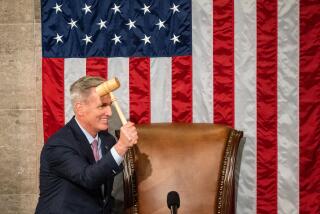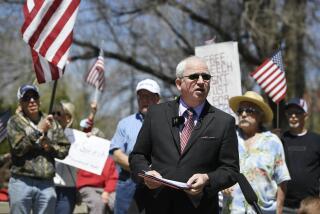Schmitz, Out of Spotlight, Confines Politics to Classroom
- Share via
John G. Schmitz, 58, a former Marine Corps pilot and instructor in Communist propaganda techniques, once commanded the most fiercely loyal, conservative political troops Orange County has ever seen.
Schmitz’s fierce Moral Majority and anti-Communist rhetoric was legend both in Washington, where he served a term as a congressman, and Sacramento, where he served as a state senator. He is a former director of the John Birch Society.
A U.S. military coup “might be the best we could hope for if President Reagan’s policies are not successful,” Schmitz said in 1981.
Two years ago, Los Angeles attorney Gloria R. Allred won $20,000 and a public apology from Schmitz for calling her a “slick butch lawyeress” in a 1981 press release.
By the time of the apology, however, Schmitz was in deeper trouble.
Schmitz’s political career ended suddenly in 1982, when court documents revealed that he had fathered two children through an extramarital affair with Carla Stuckle, a one-time Tustin school board candidate.
Today, Schmitz lives in a tree-shaded mobile home park in Tustin. He teaches political science courses at the Orange campus of Rancho Santiago College, a job he has held for nearly two decades.
Occasionally, friends say, Schmitz still visits Stuckle, who has changed her last name, and their two children.
Schmitz’s wife, Mary, a former TV talk show panelist and unsuccessful congressional candidate, now sells real estate in Washington, frequently in the Watergate complex.
Family members say the couple are still married and own the former Washington home of the late Sen. Joseph R. McCarthy (R-Wis.)--John Schmitz’s political idol.
John P. Schmitz, one of seven children by Mary Schmitz, is deputy counsel to Vice President George Bush. Another son, Joe Schmitz, is in the Washington office of the law firm that employs Irvine Councilman C. David Baker, one of the candidates seeking the Republican nomination for the 40th Congressional District seat that Schmitz won in 1970.
A few months ago, Baker said, Schmitz solicited his opinion about Schmitz’s re-entering politics by running in the hotly contested race.
“I don’t remember his exact words,” Baker said, “but it sounded like he thought that he could win in a crowded field.”
Schmitz--gaunt, graying and sporting what he called a “Bork” beard in honor of unsuccessful U.S. Supreme Court nominee Robert Bork--declined to discuss politics or his personal life.
But Thomas A. Fuentes, county Republican Party chairman and a longtime Schmitz confidant, said Schmitz recently joked that “if there were 14 Republican candidates he might be the 15th, just to offer a little color to the race.”
“I would say,” Fuentes added, “that it was said in the heartiest of jest in the typical style of John Schmitz’s renowned humor.”
Joe Schmitz said his father is looking forward to retirement next year and plans to live in Washington.
“My folks are pretty good at handling stress,” he said. “They lead a quasi-private existence. My father always believed that public service is just that. Once it’s over, it’s no longer public.
“If enough people had approached my father and asked him to run, this time he would have considered it. But he’s sort of like the old soldier at this point. He’s not going to push himself for political position.”
The former Carla Stuckle declined to be interviewed.
“The children are at the age where publicity would make them know what was going on,” she said. “I’d just as soon not have them know until they are old enough to understand.”
Schmitz recently introduced himself to an audience at Rancho Santiago College as the man who, as the American Independent Party’s 1972 presidential nominee, had finished ahead of Democrat George McGovern in four Idaho counties.
“They love me in Idaho,” Schmitz deadpanned. “I lost the presidency by a mere 44 million votes.”
Then he railed against the media, blaming the fall of South Vietnam on the media’s failure to adequately report communist involvement in the anti-war movement.
Even Watergate, Schmitz added, was a plot to divert President Richard Nixon from attending to the war.
In closing, Schmitz turned to several Vietnamese students in the audience. “You’re welcome here in America,” he said. “You may help save our country for us.”
More to Read
Sign up for Essential California
The most important California stories and recommendations in your inbox every morning.
You may occasionally receive promotional content from the Los Angeles Times.













